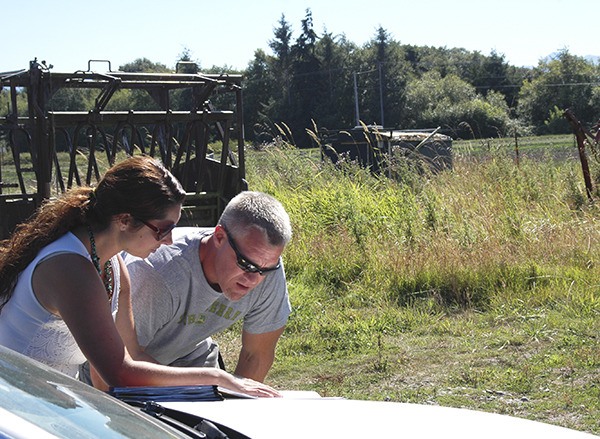The idea of summer break takes on a much different meaning for Sequim High School students involved with the Future Farmers of America program.
With livestock, including hogs and cattle and a five-acre farm to manage, the 35 students stay engaged year-round. This summer the students are partnering with the Clallam Conservation District on a cost-share agreement to enhance their farm and increase their farm management skills.
Clallam Conservation District officials agreed to pay for 75 percent of the projects planned for the FFA farm, said Jennifer Bond, Clallam Conservation District conservation planner and lead on the project.
The students, guided by Steve Mahitka, Sequim High School agriculture science teacher and FFA faculty advisor, are responsible for the remaining 25 percent of the costs, but that can come from the students’ volunteer labor and/or donated material, said Joe Holtrop, executive director of the Clallam Conservation District.
The farm improvement projects include constructing a composting facility, pouring a concrete slab for the pig pen and installing water run-off infrastructure on the barn such as gutters, downspouts and a drainage system for the barnyard. The proposed projects are anticipated to cost a total of $15,427.
Because the Clallam Conservation District’s portion of the project funding comes from a Department of Ecology grant ending in September, the project must be complete before the grant ends. Hence, Mahitka said he expects August will be a very busy month for him and the students.
“The conservation board was very supportive of this cost-share agreement because it demonstrates best farm management practices,” Bond said. “It is not just this batch of students that will learn from this project, but other students will benefit from it in years to come.”
Sequim High School 2012 graduate Casey Torres also has been instrumental in the planning and design of the projects at the FFA farm. Torres is in the midst of a summer internship with the Clallam Conservation District and is preparing for his third year at Washington State University where he’s studying civil engineering.
“I helped design the composting facility and had a lot of hands-on practice surveying the property,” Torres said. “I think the most challenging part is trying to figure out a way to best divert water away from the barn.”
The farm is located on a relatively flat piece of ground with poor-draining soils and a high water table, Torres said. In order to divert water away from the barnyard during the wet season both Bond and Torres explained piping the water away from the area and perhaps integrating some infiltration techniques may work best.
“The whole process of working with the Clallam Conservation District has been a great educational experience for the students,” Mahitka said. “These are the types of students that will likely have their own piece of ground or farm someday and this process gives them an idea on how to work with the local agencies to best manage their land.”
The students began working with Bond in the spring to help identify what the farm needed. “It was really the students that directed the creation of a farm plan,” Bond said.
Based on the students’ suggestions, the Clallam Conservation District engineer designed a composting facility that is 12 feet wide, has three compartments for the different stages of decomposition, controls waste and water run-off and allows for year-round tractor access. Ideally the students will be able to reuse the compost for fertilizer or even sell it, Makhita said.
The learning opportunity of working with the Clallam Conservation District is one example of the kind of experiences FFA students get, Mahitka said. Out of 200 students enrolled in the agriculture program at Sequim High School, only 35 are part of the FFA program. Mahitka would like to see more students engage with the FFA program because it isn’t just about raising animals, but it exposes the students to the “whole gamut of what agriculture does,” and strengthens public speaking and leadership skills.
To contact Mahitka about volunteering or donating material and/or services, call 582-3666 or e-mail smahitka@sequim.k12.wa.us.


